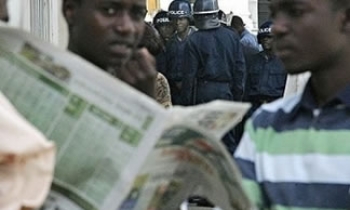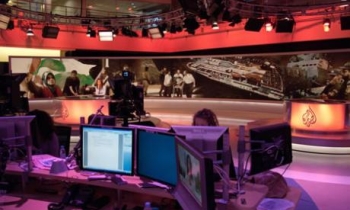Developing countries have launched an Internet-based news service intended to provide an alternative to the Western media that they claim is biased. The NAM News Network (NNN), a joint effort of the 116 member countries of the virtually defunct Non-Aligned Movement (NAM), was formally inaugurated on Tuesday last by Zainuddin Maidin, the Malaysian information minister, although it has been live online since April 17.

Through NNN, a brainchild of Malaysia which chairs the organisation, developing countries will be able to bridge the digital gap with developed nations. The aim is to set up a news network to harness information and communication technology (ICT) to promote greater information flow among NAM countries and the rest of the world.
NNN was set up by NAM members as the mechanism for news exchange and distribution, replacing the inactive Non-Aligned News Agencies Pool (NANAP). NNN now is ready to serve NAM member countries from its base at the Malaysian National News Agency (Bernama) headquarters in Kuala Lumpur.
Zainudin commended NAM members for striving to develop their media organisations and seize the unprecedented opportunities offered by today's technology to forge and strengthen communication links among themselves via NNN. "Unless we do this, we shall continue to bemoan the fact that the so-called international media have not and will never give fair coverage that is due to us," he said, acording to a Bernama report.
Zainuddin said NNN must be supported, nurtured and developed to become an important window of NAM to the world. "Admittedly, it already has its fair share of detractors but we must not be discouraged. With commitment and determination, we can make NNN a successful news organisation of the South and prove the doomsayers wrong," he said.
The idea of setting up NNN was mooted by Malaysia's former information minister Datuk Seri Abdul Kadir Sheikh Fadzir. During the Sixth Conference of Ministers of Information of Non-Aligned Countries (COMINAC VI) in November 2005, Malaysia proposed to set up a news network for NAM countries using the Internet which would allow free and unencumbered flow of information with no constraints on time, volume and form. The idea was well-received by all delegates at the COMINAC VI.
Through the NNN website, the network would carry an average of 60 news items daily with pictures contributed by participating news agencies and news organisations from 35 of the 116 NAM country members in Asia, Africa, Latin America and Europe. Besides Bernama, the other agencies are ANGOP of Angola, Antara (Indonesia), APP (Pakistan), APS (Algeria), BBS (Bangladesh), APS (Segenal), BNA (Bahrain), BuaNews (South Africa), ENA (Ethopia), GINA (Guyana), GNA (Ghana), IRNA (Iran), KBC (Kenya), KUNA (Kuwait), MAP (Morocco), MENA (Egypt), ONA (Oman), PETRA (Jordan), PRENSA LATINA (Cuba), QNA (Qatar), SABA (Yemen), SANA (Syria), SPA (Saudi Arabia), SUNA (Sudan), TNA (Thailand), VNA (Vietnam), WAM (United Arab Emirates) and ZANIS (Zambia).
Last April, the participating countries gathered in Kuala Lumpur to discuss the editorial policy and guidelines of NNN. They agreed to handle NNN with "ethics of journalism where accuracy, objectivity and common decency are steadfastly" upheld. Based on these editorial guidelines, NNN will handle news stories and images about NAM, from NAM and by NAM. The content will be informative, comprehensive, wide-ranging and progressive on economics, socio-politics and cultural development.
Each participating news organisation would have the right to transmit and receive information and also the right to "re-angle" NNN stories to suit its requirements. Each member news organisation would write its own stories and choose what material to offer to NNN on the basis of mutual interest for NAM members.
NNN was modelled after two successful news exchange networks which are in operation. One model is the Smart News Network International (SNNi), a grouping of Malaysian news organisations and 10 African countries. Another working model is the Organisation of Asia-Pacific News Agencies (OANA) which has 37 news agencies from 33 countries.
NNN has been set up to replace the defunct Non-Aligned News Agencies Pool (NANAP) whioch had been established in 1976 after a call for a New World Information and Communication Order (NWICO) spearheaded by NAM and UNESCO to curb the economic and cultural domination by developed countries. Operation of the Pool depended on telex services which were costly and inefficient.
Since many member countries could not afford the high communication tariffs while some did not have adequate linkages, NANAP became ineffective and eventually inactive after the chairmanship of the Islamic Republic News Agency of Iran (IRNA) in 1996. Many see NNN as the continuation of NANAP and hope NNN would be a viable, practical and an efficient successor to NANAP.









